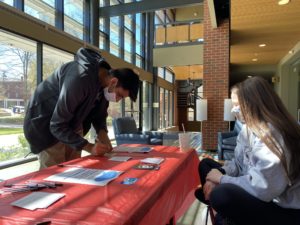Since the fall 2020 semester, Averett University public relations students have been working on a service-learning project to raise awareness of radon gas and the dangers it presents for residents of the Danville and Pittsylvania County area.
 Led by Dr. Susan Huckstep, associate professor of communication, the project is being done in conjunction with Bryan Price from the Dan River Region Cancer Task Force and eight students. The students have established Twitter and Instagram accounts to raise awareness, created a video demonstrating how to test for radon, written and recorded public service announcements for local radio, and hosted an information table on campus. They will be distributing information, offering giveaways and speaking with local residents on Saturday, April 17, from 8:30 a.m. to 2 p.m. at Crema and Vine, located at 1009 Main Street in Danville.
Led by Dr. Susan Huckstep, associate professor of communication, the project is being done in conjunction with Bryan Price from the Dan River Region Cancer Task Force and eight students. The students have established Twitter and Instagram accounts to raise awareness, created a video demonstrating how to test for radon, written and recorded public service announcements for local radio, and hosted an information table on campus. They will be distributing information, offering giveaways and speaking with local residents on Saturday, April 17, from 8:30 a.m. to 2 p.m. at Crema and Vine, located at 1009 Main Street in Danville.
“The radon awareness campaign has given us valuable public relations experience outside of the traditional classroom setting,” Grayson Eaton, a senior communications student, said. “The project allows us to put our scholarly skills to use on an important project.”
“Last semester, we were learning more about what radon was, where it comes from and basic information,” Baste Endresen, a junior communication major, said.
Radon is an invisible, odorless and tasteless gas found in basements and the lowest levels of buildings. Prolonged exposure to the gas can lead to lung cancer. Prior to the service-learning project, many of the students weren’t aware of radon or what it was.
“It’s the second leading cause of lung cancer behind cigarettes,” Kelly King, a junior communication major, said.
Price notes the radon awareness efforts are particularly important for this area. According to the EPA, both Danville and Pittsylvania County are among Virginia locations that have higher risks for radon exposure.
“As Outreach and Engagement Specialist for the University of Virginia Cancer Center, one of my main responsibilities is to increase community knowledge about cancer-causing factors that the community can control,” Price said. “Our community is somewhat familiar with breast, lung, colorectal and prostate cancer-causing factors. However, most do not know that we live in a ‘radon hotspot.’ That means that we live in an area that has the potential for elevated indoor radon levels. Our goals are to make the community aware of the situation, how to check for it in our homes and other places that we congregate, and how to remove it if radon is present.”
Testing for radon is simple, and test kits are available online and in local hardware stores. If radon is detected in an area home or business, there are remediation companies nearby in Lynchburg and Greensboro, NC.
“Radon is a silent killer. It’s very important that people test their homes because of how undetectable radon is,” Jamal Forde, a senior minoring in communication, said. “Without getting a detection kit, it’s impossible to know if you or a loved one is breathing in radon.”
To find out more about Radon, its effects and ways to reduce Radon, visit EPA.gov, follow us on Instagram or email Bryan Price.
